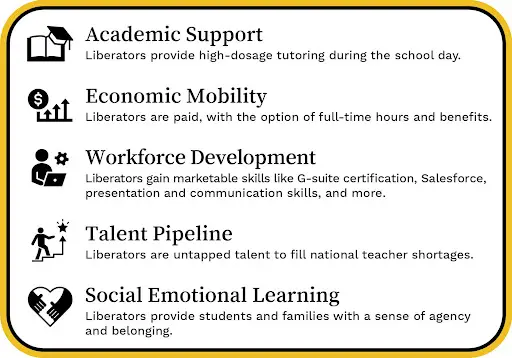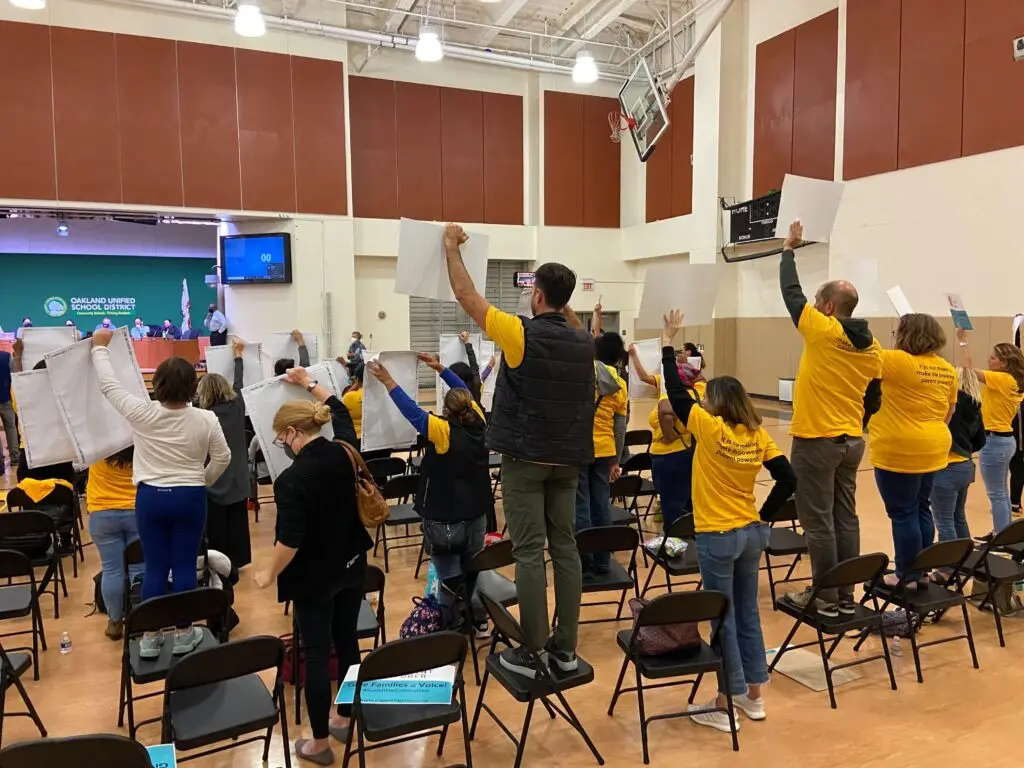We can all see where the good jobs are going. By 2025, there will be 25 million digital jobs in this country – more than manufacturing and construction combined. This means that there’s no other option: Our kids must be able to read and do math to have good jobs and good lives.
But right now, only about two out of ten kids of color in Oakland are performing at or above grade level in math. Studies show that early math skills have the greatest predictive power on future achievement, followed by reading. And, taking advanced math courses in high school is a clear predictor of college success. If we’re not equipping our kids with these skills, it will be nearly impossible to access the onramp to the good lives we want for them.
And trust us, this is what parents want. When The Oakland REACH, our grassroots parent advocacy group in Oakland, CA, surveyed our parents in 2021, 81% of them wanted high-impact math programming for their students. And it doesn’t stop there — kids want this, too. National survey data shows that Black and Latino students like math. In fact, they are more interested in math courses than their White classmates and more likely to say that math is their favorite subject, according to the survey findings.
Despite this, we often hear from families: “I’m not good at math.” Our parents say it. Our kids say it. But African history tells us a different story: Our ancestors used math to survive. Ancient civilizations in the Middle East are often credited with developing the first written system of mathematics, but new evidence shows ancient Africans were using math long before that.
And still, here we are. No one is coming to save us in math. We’ve got to make moves to accelerate math learning — and fast.
Read more about Oakland REACH’s Literacy Liberators program.
That’s why The Oakland REACH is exploring launching a second version of our “Liberator model” in math for the 2023-24 school year. The model, which we first launched around in 2021, trains parents and caregivers in the community to teach the basics of literacy through the use of phonics and other “science of reading” techniques. The model creates more opportunities for students to learn, provides more employment opportunities for the community, and helps the Oakland Unified School District’s address critical staffing needs. Like other districts nationwide, Oakland has experienced shortages of full-time staff and also tutors.

Our Math Liberator model would provide high-dosage math tutoring to students in an initial cohort of Oakland elementary schools. We’re starting with elementary grades because we need to close foundational gaps as early as possible to give our kids a real shot at being prepared to take and pass algebra in ninth grade. Trying to help students recover foundational math skills in middle school is often too late.
As we work to expand our liberator model to math, we are reminded how critical collective leadership is to increasing student outcomes. There is a lot of conflict and adversarial energy in our national education space about how to best provide a high-quality education to low-income Black and brown students. But with persistently low student outcomes, it’s clear that no matter what side people sit on, our kids continue to fail. And more of them suffer the ultimate life consequences: receiving prison bunks instead of college diplomas.
The REACH knows this all too well. Our families – 90% of whom qualify for free or reduced-price lunches, and most of whom identify as Black and Latino – have lived this struggle for generations. Now we are harnessing the collective energy of people who have not been present historically at the leadership table to build a solution and move the district to adopt it.
This work must happen together—with parents and caregivers and school staff and districts. We know it can work when we are all at the table. Steps such as helping families support early literacy at home, training more tutors, and strengthening the district’s literacy curriculum led to more than 75% of district kindergarteners being able to name 20 or more letters by December 2022, district data show. Last year at that time, only 63% of OUSD kindergarteners could do the same.

We also know collective leadership can be hard. Here are three key behaviors REACH brought to the table that allowed our parents to make decisions alongside district leaders and other powerful stakeholders:
- We are an unapologetic and urgent voice for families. Our superpower is that we are parents, and many parents trust us to take their voices and move towards powerful solutions. In 2019, many of our families told us that their children’s reading struggles were keeping them up at night. When we pulled a seat up to the table, we shared the urgency of our families’ needs. We came to partner with the district, but we’re clear on who we serve.
- We are solutions entrepreneurs. Shame does not inspire better behavior. In districts like Oakland, with low student outcomes and lots of political pressures, leaders become desensitized to criticism because it’s a survival mechanism. Finding mutual ground is critical to collective leadership. Our children not being able to read and do math is a mutual problem for both a superintendent and parents. REACH’s Liberator model offers a beneficial solution for everyone because it creates paths for schools and families to take to improve students’ reading and math outcomes.
- We speak the language. REACH has led powerful advocacy campaigns from the Opportunity Ticket, which successfully urged the school board to approve offering students in closed schools priority enrollment in higher-performing schools, to Literacy for All, part of our campaign to strengthen reading achievement. We have spoken at dozens of board meetings over the past five years in our bright yellow shirts. Our stories were personal, and our messages were simple: “We deserve access to a high-quality education,” and “Our kids can’t read.” But those actions at school board meetings sometimes have minimal impact at the leadership table where top administrators are making decisions. As parent leaders, we make it our business to understand the district’s priorities: the need, how to address the need, the historical barriers, the future considerations, the budget implications, and so on. We must be ready to pull up a chair at any and every table and adapt our leadership and language to maintain our power at each one.
By showing up in this way, both our impact and influence at the collective leadership table have increased. That’s how we are making things happen for kids.



